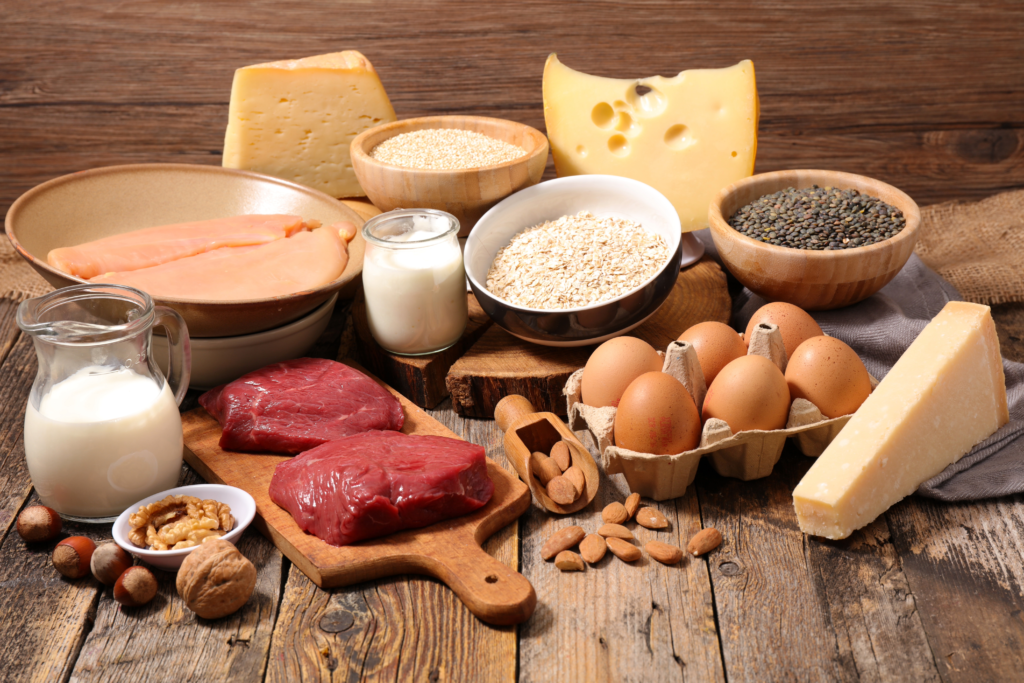
Protein and Muscle Building: The Ultimate Guide
The Role of Protein in Muscle Building
Protein is your best friend when it comes to building muscles. It’s the key nutrient that helps repair and build muscle tissue after workouts. When you exercise, your muscles go through a lot of stress and small tears. Protein helps to fix those tears and makes your muscles stronger and bigger. It’s like giving your muscles the fuel they need to grow.
How Much Protein Do You Need?
Now, you might be wondering how much protein you need to consume. The answer can vary depending on your goals and activity level. For those aiming to build muscle, a good rule of thumb is to consume about 1.6 to 2.2 grams of protein per kilogram of body weight. If you’re an active person or engage in intense workouts, you might need to be on the higher end of that range. The key is to spread your protein intake throughout the day to keep your muscles fueled and ready for growth.
Best Sources of Protein
When it comes to protein sources, variety is key. There are so many delicious options to choose from! Lean meats like chicken, turkey, and beef are fantastic sources of high-quality protein. Fish, especially salmon and tuna, are not only rich in protein but also packed with healthy omega-3 fatty acids. If you prefer plant-based options, beans, lentils, tofu, and quinoa are all excellent choices. Don’t forget about dairy products like Greek yogurt and cottage cheese, which are also great for a protein boost. Mixing up your protein sources can help ensure you get a range of nutrients and keep your meals exciting.
Timing Your Protein Intake
Did you know that the timing of your protein intake can make a difference in your muscle-building journey? Consuming protein-rich foods or supplements before and after your workouts can be especially beneficial. A protein-packed snack or shake about an hour before your workout can give your muscles the fuel they need to perform at their best. After your workout, aim to consume protein within 30 to 60 minutes to help kickstart the muscle repair process. This window of time is often referred to as the “anabolic window,” and it’s when your muscles are most receptive to protein.

Protein and Muscle Recovery
Muscle building isn’t just about hitting the gym hard; it’s also about giving your body the time it needs to recover. Protein plays a crucial role in this recovery process. When you consume protein, it provides your body with the amino acids necessary to repair and rebuild muscle fibers. This is why it’s important to include protein in every meal, not just around your workouts. A balanced diet with adequate protein can help reduce muscle soreness and improve overall recovery, allowing you to train harder and more consistently.
Protein Supplements: Do You Need Them?
Protein supplements like shakes and bars can be convenient, but are they necessary? If you’re able to meet your protein needs through whole foods, supplements might not be essential. However, they can be a useful tool for those with busy schedules or increased protein requirements. When choosing a protein supplement, look for one with minimal additives and high-quality ingredients. Whey protein is a popular choice due to its fast absorption rate, but there are also plenty of plant-based options like pea, hemp, and brown rice protein.
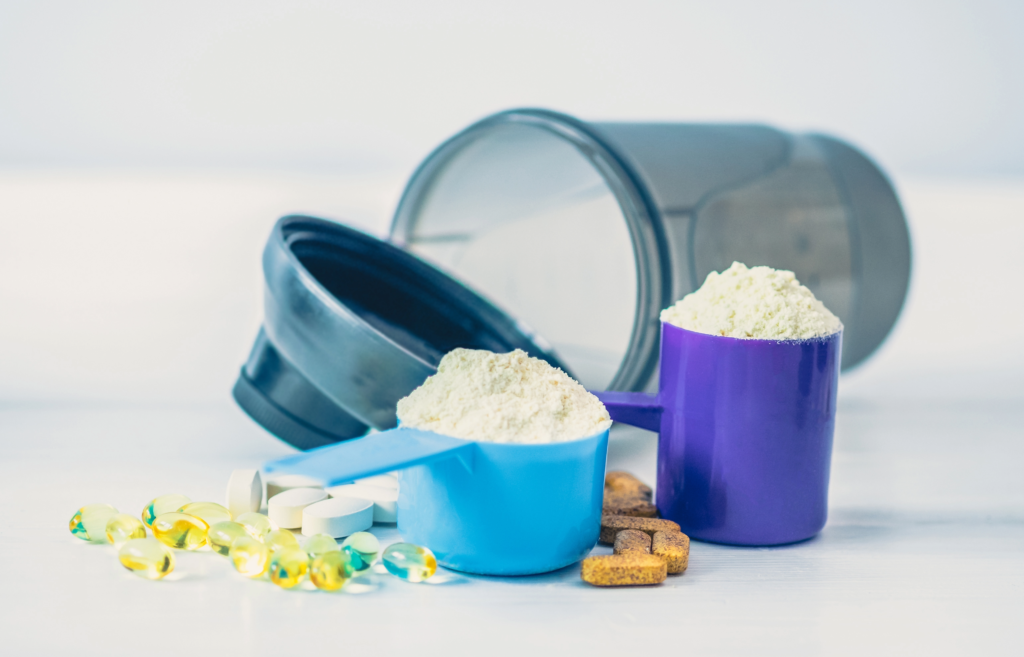
Combining Protein with Other Nutrients
Protein is important, but it’s not the only nutrient you need for muscle building. Carbohydrates and fats also play crucial roles in your diet. Carbohydrates provide the energy needed for your workouts, while healthy fats support hormone production and overall health. Combining protein with these nutrients can enhance your muscle-building efforts. For example, pairing a protein shake with a banana can give you a balanced mix of protein and carbs for post-workout recovery. Similarly, a meal with grilled chicken, brown rice, and avocado provides a good balance of protein, carbs, and healthy fats.
Staying Consistent
Consistency is key in muscle building. It’s not just about having a protein-rich meal once in a while; it’s about making it a regular part of your routine. Aim to include a source of protein in every meal and snack throughout the day. This can help ensure your muscles are constantly supplied with the amino acids they need to grow and recover. Planning and prepping your meals ahead of time can make it easier to stay on track and reach your protein goals.
Enjoying the Process
Building muscle and incorporating protein into your diet doesn’t have to be a chore. Find ways to enjoy the process and make it a part of your lifestyle. Experiment with new recipes, try different protein sources, and find what works best for you. Remember, the journey to building muscle is a marathon, not a sprint. Celebrate your progress, no matter how small, and keep pushing forward. With the right combination of protein, hard work, and patience, you’ll be well on your way to achieving your muscle-building goals.
Protein for Weight Management: The Ultimate Guide
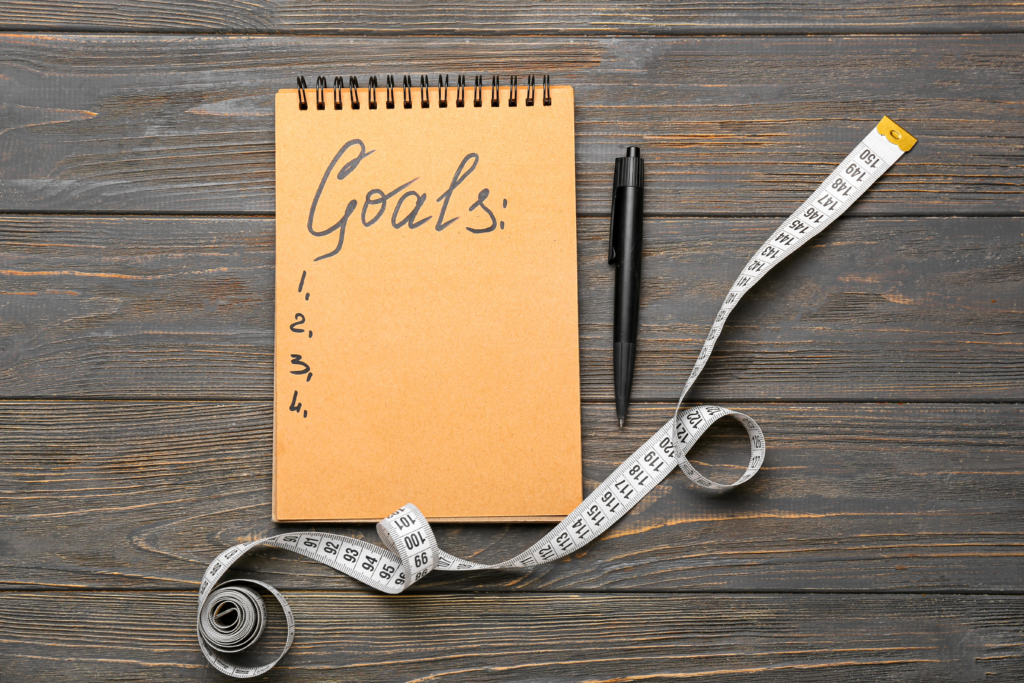
The Power of Protein in Weight Management
Protein isn’t just for bodybuilders and athletes; it’s a crucial nutrient for everyone, especially if you’re trying to manage your weight. When you eat protein, it helps you feel full and satisfied, which can curb cravings and prevent overeating. Imagine not feeling the need to reach for a snack every hour! This is because protein takes longer to digest than carbohydrates, so it keeps you feeling fuller for longer. Incorporating more protein into your diet can make weight management a more achievable and enjoyable process.
How Protein Boosts Your Metabolism
Did you know that eating protein can actually help you burn more calories? It’s true! This process is known as the thermic effect of food (TEF), and protein has a higher TEF compared to fats and carbs. This means your body uses more energy to digest and metabolize protein, resulting in a slight boost in your metabolism. So, by simply eating more protein, you can increase the number of calories you burn each day. This metabolic boost can be a helpful addition to your weight management strategy.
The Best Protein Sources for Weight Management
When it comes to choosing protein sources, variety is key. Lean meats like chicken, turkey, and fish are excellent options. They’re low in fat and high in protein, making them perfect for weight management. If you prefer plant-based options, beans, lentils, tofu, and quinoa are fantastic choices. They provide not only protein but also fiber, which adds to that feeling of fullness. Dairy products like Greek yogurt and cottage cheese are also great protein-packed options that can be easily incorporated into meals and snacks.
Planning Your Protein Intake
Strategically planning your protein intake can make a big difference in your weight management journey. Aim to include protein in every meal and snack throughout the day. This helps maintain steady blood sugar levels and keeps hunger at bay. For breakfast, try a protein-rich smoothie with Greek yogurt and fruits. At lunch, a chicken salad or a lentil soup can keep you satisfied. Dinner can be a piece of grilled fish with a side of quinoa and vegetables. By distributing your protein intake evenly, you’ll feel more satisfied and less likely to overeat.
Protein and Healthy Snacking
Snacking can be a tricky area when managing your weight, but choosing protein-rich snacks can help you stay on track. Instead of reaching for chips or sweets, opt for snacks like a handful of nuts, a piece of cheese, or a boiled egg. These options provide protein that helps curb hunger without adding unnecessary calories. Protein bars and shakes can also be convenient for those on the go, just be sure to check the labels for added sugars and unwanted ingredients.
Combining Protein with Exercise
While protein is essential, combining it with regular exercise can maximize your weight management efforts. Protein supports muscle repair and growth, which is crucial if you’re engaging in strength training or other forms of exercise. Building muscle not only makes you stronger but also increases your resting metabolic rate, meaning you burn more calories even at rest. Aim to pair your workouts with protein-rich meals or snacks to support recovery and muscle growth. This combination can help you achieve a leaner, healthier body.
Hydration and Protein
Don’t forget about hydration! Drinking plenty of water is important, especially when you’re increasing your protein intake. Water helps with digestion and can enhance the thermic effect of protein, further boosting your metabolism. Aim to drink water throughout the day and consider having a glass before meals to help control your appetite. Staying hydrated is a simple yet effective way to support your weight management goals.
Listening to Your Body
Everyone’s body is different, so it’s important to listen to yours. Pay attention to how different protein sources and meal timings affect your hunger and energy levels. Some people may feel more satisfied with animal proteins, while others thrive on plant-based options. Experiment with different foods and find what works best for you. Remember, weight management is a personal journey, and what works for one person might not work for another. Trust your body and adjust your diet as needed.
Staying Consistent and Patient
Consistency is key when it comes to weight management. It’s not about drastic changes but rather making sustainable choices that you can stick with long-term. Focus on gradually increasing your protein intake and finding enjoyable ways to incorporate it into your meals. Be patient with yourself and celebrate small victories along the way. Weight management is a marathon, not a sprint, and the goal is to create a healthy lifestyle that you can maintain.
Enjoying the Process
Remember to enjoy the process. Healthy eating doesn’t have to be boring or restrictive. Explore new recipes, try different protein sources, and make meal planning an enjoyable activity. Surround yourself with supportive people who encourage your goals. By finding joy in your journey, you’re more likely to stick with it and achieve lasting success. Protein is just one piece of the puzzle, but with the right mindset and approach, it can be a powerful tool in your weight management toolkit.
The Role of Protein in a Balanced Diet
Why Protein is Essential
Protein is a superstar in the world of nutrition. It’s not just for bodybuilders and athletes; everyone needs protein. It helps build and repair tissues, makes enzymes and hormones, and supports overall health. When you eat protein, you give your body the building blocks it needs to function properly. Whether you’re growing, healing, or just maintaining your health, protein plays a vital role. Without enough protein, your body can’t repair itself efficiently, and you might feel tired and weak.
How Protein Supports Your Body
Your body relies on protein for countless functions. It helps build muscles, skin, hair, and nails. Every cell in your body contains protein, and it’s essential for maintaining and repairing tissues. When you eat protein-rich foods, your body breaks them down into amino acids. These amino acids are then used to build new proteins that your body needs. Protein also helps produce enzymes that aid in digestion and other chemical processes. Simply put, without protein, your body wouldn’t be able to function.
Finding the Right Balance
Incorporating protein into a balanced diet is easier than you think. Aim to include a source of protein in every meal. This can be lean meats, fish, eggs, dairy, beans, nuts, or tofu. Each of these foods provides not only protein but also other essential nutrients. For example, fish is rich in omega-3 fatty acids, and beans are packed with fiber. By diversifying your protein sources, you get a variety of nutrients that contribute to your overall health. Balance is key, so pair your protein with fruits, vegetables, whole grains, and healthy fats.
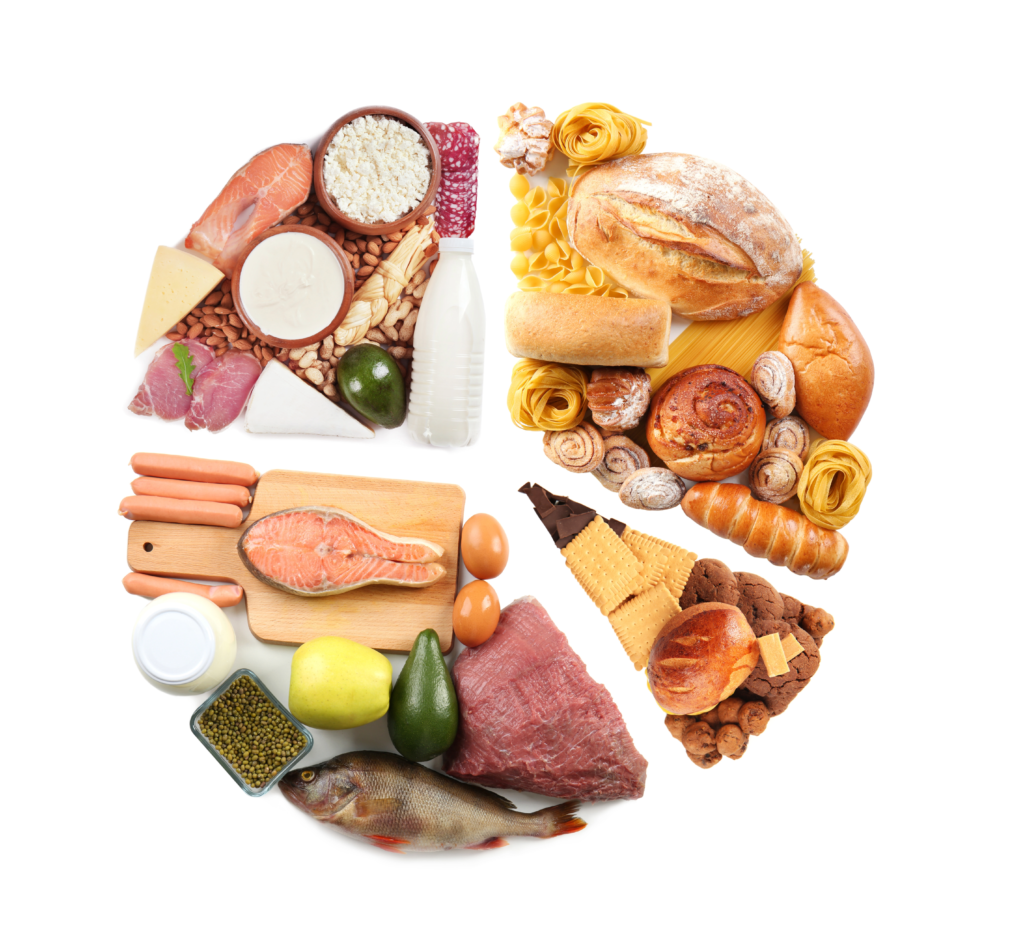
Protein and Weight Management
Protein is a powerful ally in weight management. It helps you feel full and satisfied, reducing the chances of overeating. When you eat protein, it takes longer to digest, keeping you fuller for longer. This can help you stick to your diet and avoid unhealthy snacks. Additionally, protein boosts your metabolism because your body uses more energy to digest it compared to fats and carbs. By including more protein in your meals, you can manage your weight more effectively.
Protein for Muscle Health
Muscles are made of protein, so it’s no surprise that protein is crucial for muscle health. If you exercise regularly, your muscles need protein to repair and grow. After a workout, your muscles undergo tiny tears that need to be repaired. Protein provides the amino acids necessary for this repair process. This is why athletes and fitness enthusiasts emphasize protein intake. Even if you’re not lifting weights, maintaining muscle mass is important as you age. Protein helps keep your muscles strong and functional.
Protein Myths
There are many myths about protein that can be confusing. Some people think that only animal products are good sources of protein. However, plant-based proteins like beans, lentils, and quinoa are excellent options. Another myth is that more protein is always better. While protein is important, balance is key. Consuming too much protein can strain your kidneys and lead to other health issues. The best approach is to include a variety of protein sources in moderate amounts.
Simple Ways to Add More Protein
Adding more protein to your diet doesn’t have to be complicated. Start your day with a protein-rich breakfast like Greek yogurt with berries or eggs with whole-grain toast. For lunch, try a salad with grilled chicken or chickpeas. Snacks can include nuts, seeds, or a protein smoothie. Dinner options are endless, from fish tacos to tofu stir-fry. The goal is to make protein a regular part of your meals without feeling like you’re on a restrictive diet.
Understanding Protein Needs
Everyone’s protein needs are different. Factors like age, gender, weight, and activity level all play a role. Generally, adults should aim for at least 100 grams of protein per day, but this can vary. If you’re very active or trying to build muscle, you might need more. It’s always a good idea to consult with a healthcare provider or nutritionist to determine your specific needs. By understanding your body’s protein requirements, you can make better dietary choices.
Protein and Health Benefits
Protein offers numerous health benefits beyond just muscle repair. It supports a healthy immune system, helps maintain a healthy weight, and can even improve your mood. Amino acids from protein are used to produce neurotransmitters like serotonin, which influence mood and sleep. Eating enough protein can help you feel more energetic and focused throughout the day. It’s a versatile nutrient that benefits every part of your body.
Enjoying a Protein-Rich Diet
A protein-rich diet doesn’t have to be boring. There are countless delicious and nutritious ways to enjoy protein. Experiment with different recipes and cooking methods. Try new foods and combine flavors to keep your meals exciting. Remember, the goal is to nourish your body while enjoying what you eat. By incorporating a variety of protein sources, you can maintain a balanced diet that supports your health and wellbeing.
The Takeaway
Protein is an essential part of a balanced diet. It supports countless functions in your body, from building muscles to boosting your metabolism. By including a variety of protein sources in your meals, you can ensure you’re getting the nutrients you need. Remember to balance your protein intake with other food groups and enjoy the process of creating nutritious, delicious meals. Protein isn’t just a nutrient; it’s a key to a healthier, happier you.
Surprising Sources of Protein
Discover Hidden Protein Gems
When you think of protein, you probably picture chicken breasts or steak. But did you know there are plenty of unexpected sources of protein out there? Discovering these hidden protein gems can be a fun and delicious way to diversify your diet. You might be surprised to learn that some of your favorite foods are packed with protein, helping you meet your nutritional needs without always resorting to the usual suspects. Let’s dive into some surprising sources of protein that you can easily incorporate into your meals.
Protein-Packed Vegetables
You might not immediately think of vegetables when you consider protein, but certain veggies can significantly contribute to your daily intake. For example, a cup of green peas contains about 8 grams of protein. Spinach is another green powerhouse, offering around 5 grams of protein per cooked cup. Even the humble Brussels sprout provides about 3 grams of protein per cup. Incorporating these vegetables into your diet boosts your protein intake and adds a variety of vitamins, minerals, and fiber. Next time you’re making a salad or a stir-fry, remember that these greens can pack a protein punch!
Beans and Legumes: More Than Just Fiber
Beans and legumes are well-known for their fiber content, but they’re also excellent sources of protein. A cup of lentils contains a whopping 18 grams of protein. Chickpeas, which are great in salads or turned into hummus, offer about 15 grams per cup. Even black beans, which are delicious in soups or burritos, provide 15 grams of protein per cup. These versatile foods are not only filling but also affordable and easy to prepare. Whether you’re making a hearty bean stew or adding some lentils to your curry, you’re getting a significant protein boost with every bite.
Nuts and Seeds: Small But Mighty
Nuts and seeds might be small, but they’re mighty when it comes to protein content. Almonds, for instance, offer about 6 grams of protein per ounce. Pumpkin seeds, which make a great snack or salad topping, provide about 7 grams per ounce. Even chia seeds, which you can add to smoothies or yogurt, contain about 5 grams of protein per ounce. These nutrient-dense foods are also packed with healthy fats, fiber, and a variety of vitamins and minerals. They’re perfect for snacking, baking, or adding a crunchy texture to your meals. Next time you’re feeling peckish, grab a handful of nuts or seeds for a protein-packed snack.
Dairy and Dairy Alternatives
Dairy products are traditional protein sources, but dairy alternatives can be equally impressive. Greek yogurt, for example, contains about 10 grams of protein per 100 grams. Cottage cheese is another excellent choice, offering about 11 grams of protein per 100 grams. If you’re lactose intolerant or prefer plant-based options, soy milk and tofu are fantastic alternatives. A cup of soy milk provides about 7 grams of protein, while 100 grams of tofu offers around 8 grams. These options are great for breakfast, snacks, or even as ingredients in savoury dishes. Enjoy a bowl of Greek yogurt with fruit, or stir-fry tofu with veggies for a protein-packed meal.
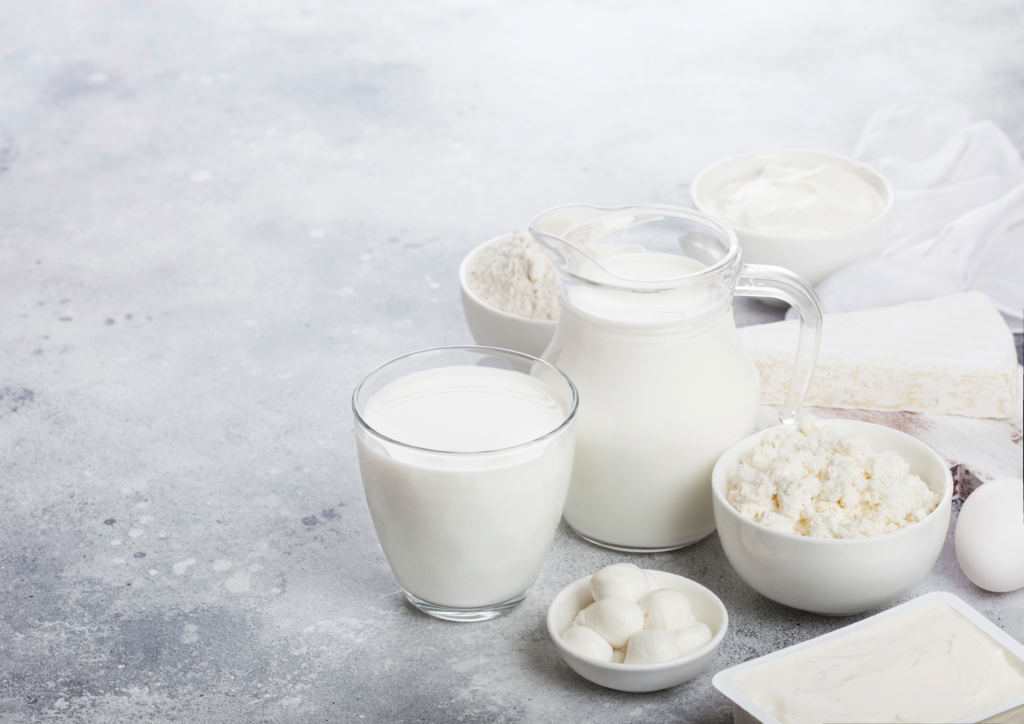
Whole Grains: More Than Just Carbs
Whole grains are often associated with carbohydrates, but many of them are surprisingly high in protein as well. Quinoa, often called a superfood, contains about 8 grams of protein per cup. Farro, a type of ancient wheat, offers around 6 grams per cup. Even oats, which make a hearty breakfast, provide about 6 grams of protein per cup. These grains are not only protein-rich but also packed with fiber, making them a filling and nutritious addition to any meal. Try swapping out your usual rice or pasta for these whole grains to boost your protein intake. Quinoa salads or oatmeal with nuts are both tasty and protein-rich.
Eggs: The Versatile Protein Powerhouse
Eggs are a well-known source of protein, and for good reason. One large egg contains about 6 grams of protein, making it a perfect addition to any meal. Eggs are incredibly versatile; you can enjoy them scrambled, boiled, poached, or even baked into dishes like quiches and frittatas. They’re also an excellent source of essential vitamins and minerals, such as vitamin B12 and selenium. Whether you have them for breakfast, lunch, or dinner, eggs are a convenient and affordable way to get your protein fix. Start your day with a protein-packed omelet or add a boiled egg to your salad for a boost.
Surprising Snacks: Protein in Disguise
Snacks can also be a surprising source of protein. Edamame, for instance, is a tasty and protein-rich snack with about 17 grams per cup. Hummus, made from chickpeas, offers about 2 grams of protein per tablespoon and pairs perfectly with veggies or whole-grain crackers. Even popcorn can be a decent protein snack when paired with nutritional yeast, which adds a cheesy flavor and a protein boost. These snacks are not only delicious but also help keep you full and satisfied between meals. Next time you’re in need of a snack, reach for these protein-packed options instead of the usual chips.
Seafood: Beyond Fish
When considering protein sources, seafood is often associated with fish, but there are other sea creatures that are high in protein. For example, shrimp contains about 20 grams of protein per 3-ounce serving. Scallops offer around 17 grams of protein per 3 ounces. Even seaweed, which you might enjoy in sushi, has some protein content, with about 2 grams per cup. These options add variety to your diet and provide essential nutrients like omega-3 fatty acids. Experiment with different seafood dishes to enjoy these protein-rich foods. Try shrimp stir-fry or scallop ceviche for a light yet satisfying meal.
Incorporating Surprising Protein Sources
Incorporating these surprising protein sources into your diet can be both fun and beneficial. By diversifying your protein intake, you can enjoy a wider range of nutrients and flavours. Whether you’re a vegetarian, vegan, or just looking to mix things up, these foods can help you meet your protein needs in delicious and unexpected ways. Try new recipes, explore different cuisines, and don’t be afraid to get creative in the kitchen. Your taste buds and your body will thank you for it.
Conclusion
Discovering surprising sources of protein can transform your diet in tasty and fun ways. From protein-packed vegetables and versatile beans to nutrient-dense nuts and whole grains, these hidden gems add flavour and nutrients to your meals. Including these foods in your diet helps meet your protein needs and adds important vitamins, minerals, and fiber. By trying these different protein sources, you can enjoy a balanced and satisfying diet that supports your health goals. So, next time you’re planning your meals, think beyond the usual options and enjoy the many protein choices available to you. Your taste buds and your body will thank you.
